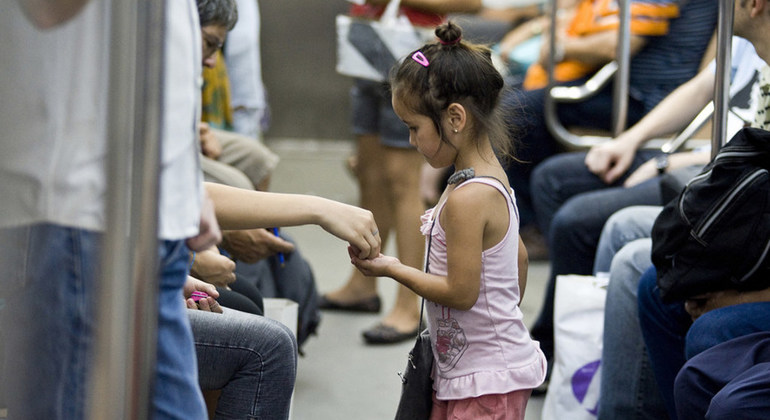In a UN-backed report assessing the capacity of 180 countries to ensure that their youngsters can survive and thrive, the authors highlight numerous “immediate” threats to their health, environment and opportunities.
These include runaway greenhouse gas emissions, predatory advertising and deepening inequality in and among countries.
“No country in the world is currently providing the conditions we need to support every child to grow up and have a healthy future,” said Anthony Costello, Professor of Global Health and Sustainability at University College London, one of the lead authors of the report, commissioned by the World Health Organization (WHO), UN Children’s Fund (UNICEF) and The Lancet medical journal.
“Especially, they’re under immediate threat from climate change and from commercial marketing, which has grown hugely in the last decade,” Professor Costello – former ;WHO Director of Mother, Child and Adolescent health – told journalists.
Growing inequality “in all countries” is also responsible for undermining children’s prospects, Professor Costello maintained.
This is the case even in wealthy industrialized nations like the United Kingdom, which had “very serious issues” with child poverty and inequality.
“The poorest countries have a long way to go to let their children be healthy, but the wealthy countries are threatening the future of all children through these excessive carbon emissions,” he said.
“We agree with Greta Thunberg when she says our world is on fire.”
250 million children under five at risk
An estimated 250 million children under five in low and middle-income countries are at risk of not reaching their development potential, said former Prime Minister of New Zealand and Co-Chair of the Commission, Helen Clark.
“But of even greater concern, every child worldwide now faces existential threats from climate change and commercial pressures,” she stressed.
Data for the report – A Future For The World’s Children – was gathered according to criteria that included survival and death rates, educational achievement and nutrition.
National emissions forecasts for 2030 and levels of inequality were also taken into account for the global index:
Norway tops ‘wellbeing’ criteria – but trails on emissions
- Norway leads the table for survival, health, education and nutrition rates – followed by the Republic of Korea and the Netherlands; Central African Republic, Chad and Somalia come bottom.
- However, when taking into account per capita CO2 emissions, these top countries trail behind, with Norway 156th, the Republic of Korea 166th and the Netherlands 160th.
- Each of the three emits 210 per cent more CO2 per capita than their 2030 target, the data shows, while the U.S, Australia, and Saudi Arabia are among the 10 worst emitters.
- The lowest emitters are Burundi, Chad and Somalia.
- According to the report, the only countries on track to beat CO2 emission per capita targets by 2030, while also performing fairly – within the top 70 – on child flourishing measures are: Albania, Armenia, Grenada, Jordan, Moldova, Sri Lanka, Tunisia, Uruguay and Viet Nam.
Getting tough on harmful advertising
Citing a tenfold rise in child obesity since 1975 – from 11 to 175 million children –Professor Costello& maintained that “harmful advertising” encouraged children to buy things that affected their development and health, such as sugary snacks and drinks, fast food, alcohol and cigarettes.
And citing a huge expansion of vaping adverts, he added that in Brazil, China, India and Nigeria,& two-thirds of five and six-year-olds could identify at least one cigarette brand logo.
“We know that advertising preys on children, that in some countries they’re seeing 30,000 TV adverts a year,” he insisted. “In America (the U.S.) for example, a lot of children are seeing over four alcohol adverts a day.”
‘Surveillance capitalism’ the greatest fear
Despite these threats, the biggest fear& among health professionals now is the trend for“surveillance capitalism” that fuels social media advertising, along with “algorithmic targeting”, Professor Costello said.
“I’ve been rather horrified to learn that many of the games that are put out to young children are actually made by advertising companies who then will sell on all the data of those children without permission to major (online) companies,” he said.
Social media should send positive messages
Among the report’s recommendations is the addition of a new optional protocol to the UN Convention on the Rights of the Child to help countries manage this practice, as well as the need to harness social media to share positive health messages too.
“Children have the right not to be bombarded every day on their phones with advertisements or to have their data stolen,” Professor Costello said.
Among its other recommendations, the report calls for Governments and communities to put children at the centre of investment in primary healthcare, education and universal healthcare, in line with the 17 universally-agreed Sustainable Development Goals (SDGs).
But even more important than this is meeting carbon emission targets to reduce global temperature increase to below 1.5 degrees Celsius above pre-industrial levels, Professor Costello insisted.
“There’s an irrefutable ethical and economic case to invest in children throughout the lifespan and across generations and we should be doing far more to get that across to politicians, because countries that invest in their children are the most successful longer-term,” he added.



